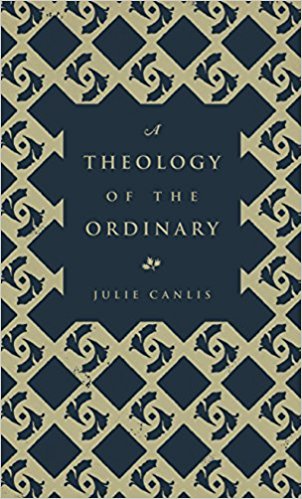August 19, 2017
Book Review
A Theology of the Ordinary
By Julie Canlis
ISBN 978-0-692-84028-3
Published 2017
–Review by Douglas Balzer
Wonder! It is one characteristic I appreciate in a book. When an author is able to capture me as Julie Canlis did in her book A Theology of the Ordinary there is only one thing I can do –share the beauty of an artful tome.
The book came to my attention through reviewing the livegodspeed.org website reviewed by Ashley Linne May 21, 2017. If you didn’t happen to read her review, here is the link https://preachthestory.com/godspeed/. I highly recommend reading her comments and following the link to the site. It is worth your time.
Decades ago, I won’t say exactly how many; I was introduced to the concept of The Normal Christian Life through Watchman Nee. When I read Julie’s title for this book, my mind went towards Nee’s work. I will say her book is a wonderful surprise. It took in a very different direction than my preconceived ideas of normal or ordinary. I recommend you read this book in its entirety, including the introduction. The set up of the lecture through the introduction assists in drawing the subsequent chapter together cohesively.
Julie introduces us to the American culture of competitive marketing by trying to explain it to her daughter who was eight years old and has never been exposed to the culture of America exceptionalism. It is within this perspective that Julie opens up a conversation about the buzz of this culture and how it has extended itself within the Christian culture. The point Julie makes is that the overt expectation that has developed within the life of everyday people has been co-opted. Normal or ordinary life is unacceptable even for Christ-followers. Everyone must be an exception or extraordinary.
In her examination, A Theology of the Ordinary, Julie starts from the beginning of the origins of the culture within the evangelical ranks of Christianity in America. The first chapter deals with the origin coming out of the revival period with Charles Finney. Specifically, she finds that Finney’s system was developed through studying how to manipulate people and set up situations to fuel the revival, re-revival, and re-re-revival. It explains how the burned over districts were developed due to excessive abuse of Finney’s method. Finney’s culpability for fostering the cultural climate we have received becomes evident. It makes one ask questions of Finney and his motivations and tactics. Within this chapter, a comparison between what Finney brought about and what the scripture calls for as the expectations of an average Christian life are laid as a foundation for the sequence of the lectures.
In the second chapter, Julie takes us on a journey of filling in the vacancy within the average Christian life by beginning with Genesis in the Garden, our origin as a species, creatures of God’s creation. The beauty of this chapter is how well she brings us, the reader, back to the reality of God’s intentions for the human creation. Her approach reminds me of a clear narrative theology of engaging the story. The story tells us there is “a right understanding of what it means to be human,” and “a right understanding of the world.” Then she closes with a what has been offered as a “Counter-story.”
As the book progresses, Julie develops her argument by continuing to build each section on the previous. With this style of writing the story builds momentum for supporting the argument of what should be an appreciation for God’s redemptive work. For example in developing this theology of the ordinary, Julie links the days of creation with Jesus life. While doing this, she asks us to participate by asking ourselves, “What is He doing to my humanity in each of these stories?” The exercise brings the narrative to a whole new level within the practices of spirituality in the Christian life. The exercise what quite stimulating and revealing for me.
Still, A Theology of the Ordinary develops further by her pulling together the themes. In the final chapter, she writes that there is an answer to the drive to be exceptional or extraordinary. It all culminates and is realized in and through the Spirit of God. The Spirit has always been dealing with people in the real-world. In the margin of the book, I wrote the words to a song the band Smash Mouth sings – “just an everyday superhero.” The theology of this little book brought me back to the reality that it is in the ordinary days of life the most heroic activities are displayed in consistency.
Now there is much more to this little book than I have shared here. What this book did for me is think about our motivations as humans. What are we trying to develop or create? Is it fair to others to place expectations that are not grounded in the fact most people are living everyday lives that are ordinary? Personally, I found a sense of relief reading these lecture by Julie Canlis. I think you might as well. Pick it up. If you like it, you will keep it and reference it just to help keep you grounded in the ordinary where life happens. Oh yes, there are some bonuses in the book that I did not mention. I will let you discover them on your own. If you enjoyed the review leave a comment. We appreciate your participation.

